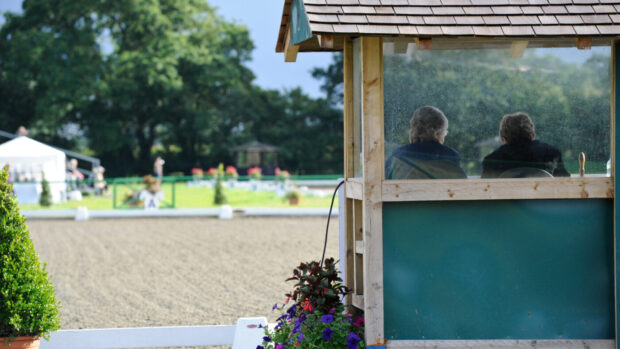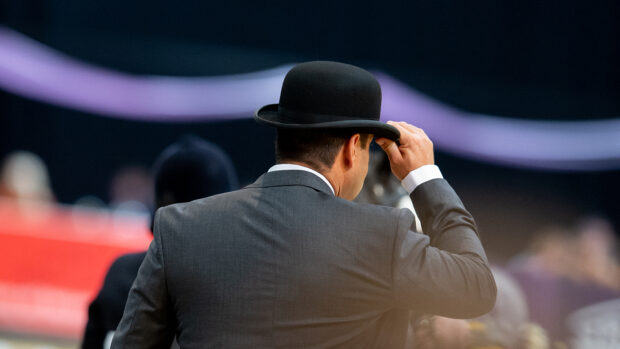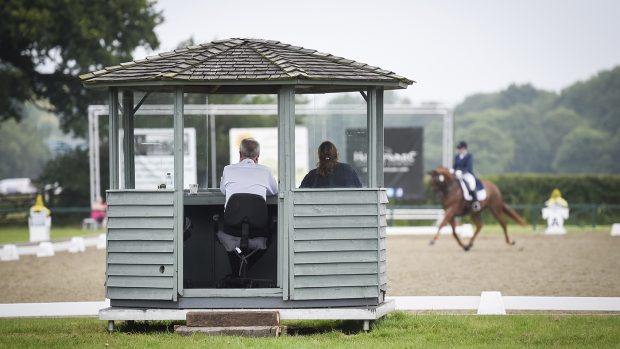Richard Davison, a four-time dressage Olympian and former British World Class performance manager, who has been at the forefront of international dressage for more than 30 years, shares his views on horse abuse, social media and protecting judges
Reports of horses being worked to death at the Appleby Horse Fair were shocking. When it comes to punishing those responsible it will be a long haul. A successful prosecution depends on securing enough credible evidence to satisfy the criminal standard of proof and even then there’s a backlog in the courts.
It shows why calls for regulated horse sport to be banned in the interest of equine welfare are misguided. In regulated sport not only is there 24/7 oversight but riders and owners are also traceable and the imposition of sanctions is quicker and has a lower standard of proof compared to criminal proceedings.
 Watch the video
Watch the videoOnline abuse of judges
You might have noticed a new face popping up on your Instagram feeds – that’s right, I’ve finally joined the party!
Having been goaded into this by fellow riders, it was “cameraman to the stars” Harry Sykes who provided endless patient mentoring so I can now bash out a reel in record time. But here’s the scoop: the secret to gaining followers, according to seasoned ’grammers is to expose my “handle”. So, here it is: @davisonequestrian.
On social media, it’s not just riders who have been subjected to abuse. Judges have also received the same treatment and several have told me they are reflecting on whether or not to continue. With scores and competition videos now easily accessible online, judges are under relentless scrutiny.
In technical tests, the primary role of the judge is to select the appropriate mark for each movement. Since judges are rightly afforded only the narrowest of margins of discretion when it comes to personal opinion, the question is what is the “right” score?
Although that is all set out in the FEI’s Judging Manual and Dressage Rules, recalling the contents of the hundreds of pages is the weak link.
I was part of a two-year study commissioned by the FEI that involved convening a group of psychologists from Nottingham Trent University to analyse judges’ cognitive processes, including their observation power and ability to concentrate for long periods of time.
It’s no surprise that the experts advised that memorising and recalling pages of thousands of words was highly likely to result in inconsistencies.
On the other hand, images are much easier to retain and that’s why other judged sports – like gymnastics – already have their scoring systems codified in various, easily recallable formats.
The FEI then commissioned a group of expert stakeholder representatives to draft a code of points to act as a standard reference for the grand prix movements, which could then be used as a blueprint for other tests.
As you can imagine this was an exercise in compromise given the passion of the dressage experts involved. But a consensus was reached and the code of points has been sitting on a shelf ready to go for some time now.
Level the playing field
Criticism of the current scoring system is now coming from all directions. At the World Cup Final, competitor Morgan Barbançon Mestre was vocal in her call for greater transparency and for consistency.
It was also a nod from the International Olympic Committee president that led to the creation of the code of points.
FEI dressage director Ronan Murphy makes it clear that he intends to bring his combined experience of business and modern sports governance into dressage and 2025 provides the perfect opportunity to implement the code of points since it is the first year of the next Olympic cycle.
It’s not only critical we provide a level playing field and fairness for riders, but we must also protect our judges and the integrity of the sport. Fortunately for Ronan it’s not a case of having to reinvent the wheel – it’s just a matter of fitting it.
● What rule changes would you like to see introduced in dressage? Write to us at hhletters@futurenet.com, including your name, nearest town and country, for the chance for your letter to appear in a forthcoming issue of the magazine
- This exclusive column will also be available to read in Horse & Hound magazine, on sale Thursday 20 June
You might also be interested in:

New recommendations to improve dressage judging
The FEI’s dressage judging working group has proposed 19 recommendations for improvements to the current judging system

‘We need to change’: top judge calls for action on the future of dressage

The Horse & Hound Podcast 147: British dressage Olympian Richard Davison

Subscribe to Horse & Hound magazine today – and enjoy unlimited website access all year round
Horse & Hound magazine, out every Thursday, is packed with all the latest news and reports, as well as interviews, specials, nostalgia, vet and training advice. Subscribe today and enjoy the magazine delivered to your door every week, plus unlimited website access and digital versions of the magazine dating back to September 2012.



